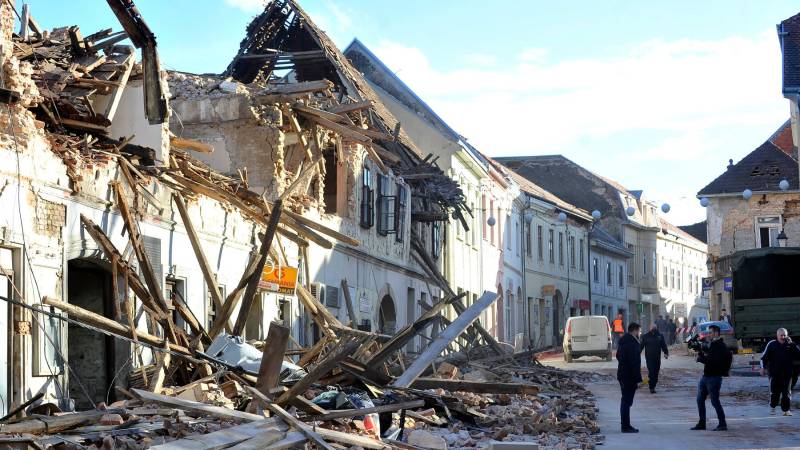Six dead as strong quake strikes central Croatia

Stay tuned with 24 News HD Android App

A powerful earthquake killed at least six people as it tore down buildings in central Croatia on Tuesday, leaving a town near the epicentre without electricity as rescuers combed toppled roofs and rubble in the dark.
The tremors were felt as far afield as Vienna while the damage was concentrated in and around Petrinja, a town some 50 kilometres (30 miles) south of Croatia's capital Zagreb.
Among the dead were a young girl in Petrinja and five people in a nearby village, Croatian police said.
As rescue teams shovelled away bricks and other debris, some elderly residents gathered in a park in downtown Petrinja, wrapped in blankets and afraid to return home.
"All the tiles in the bathroom are broken, all the dishes fell out", Marica Pavlovic, a 72-year-old retired meat factory worker, told AFP of the damage to her home.
"Even if we wanted to, we can't go back in, there is no electricity."
Earlier in the day Prime Minister Andrej Plenkovic said containers would be brought in to house those whose homes remained risky, while military barracks could also take in residents.
"It is not safe to be here, that's clear as day now," Plenkovic said as he took stock of the wreckage in Petrinja, which is home to some 20,000 people.
While officials were tallying the scale of the destruction, Petrinja's mayor Darinko Dumbovic said that a -- luckily empty -- kindergarten was among the buildings that collapsed from the force of the quake.
"The city is actually a huge ruin. We are saving people, we are saving lives. We have dead people, we have missing people, injured people...it is a catastrophe," Dumbovic told national radio earlier in the day.
Two quakes
The earthquake, which hit around 1130 GMT according to the US Geological Survey, rattled Petrinja and the surrounding area just one day after a smaller earthquake struck in the same vicinity, causing some damage to buildings.
Josip Horvat, a 44-year-old artist, said he was fixing a friend's chimney that had been damaged the previous day when Tuesday's tremor struck.
"I grabbed the gutter and I was just praying to God that it ends as soon as possible," he told AFP, lamenting the "disaster" downtown.
Tuesday's quake also shook the capital Zagreb, where panicked residents gathered in the streets as the shocks tore the tiles off roofs.
The tremors reverberated across neighbouring countries, including Serbia and Slovenia, which moved to shut down the Krsko nuclear power plant it co-owns with Croatia out of precaution.
European Union leaders said they were closely following the "devastating earthquake" and ready to send in help.
Charles Michel, president of the European Council, said "our thoughts go out to the injured and frontline workers".
In March, Zagreb's city centre was damaged by a 5.3-magnitude quake, the most powerful to hit the capital in decades.
The Balkan region lies on major fault lines and is regularly hit by earthquakes.
Slovenia nuclear plant shut after Croatia earthquake
Slovenia's Krsko nuclear power plant has been shut down as a precaution after a 6.4 magnitude earthquake was registered in neighbouring Croatia, the plant's spokeswoman said Tuesday.

"Due to today's earthquake, the Nuclear Power Plant of Krsko automatically shut down and is in a safe shutdown mode," a statement on the plant's website said, adding that checks would be performed on its systems and equipment.
Infrastructure Minister Jernej Vrtovec said that the plant should be reconnected to the electricity network within 24 hours, according to the STA agency.
The earthquake was felt in several neighbouring countries, including Slovenia and as far away as the Austrian capital Vienna.
A session of parliament in Slovenia had to be suspended and light damage to buildings was reported in the east of the country, as well brief interruptions to electricity networks.
Krsko is Slovenia's sole nuclear power plant and lies about 100 kilometres (60 miles) east of the capital Ljubljana.
The 700-megawatt Westinghouse reactor was built in the former Yugoslavia and went into service in 1983.
It is co-owned by Slovenia and Croatia.
The plant provides for around 20 percent of Slovenia's electricity needs and 15 percent of Croatia's but environmental campaigners have previously called for it to be shut down because of its age and the risks of seismic activity in the region.
It was originally due to be switched off in 2023, but Ljubljana and Zagreb decided in 2015 to extend its lifetime by another 20 years.
